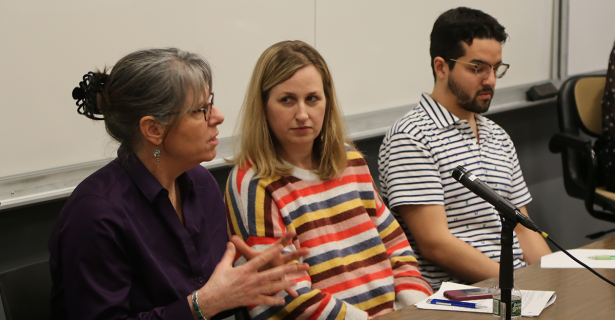To close the theme of migration, the Latin American Committee (LAC) hosted a panel with Professor Katrina Burgess, Professor Helen Marrow, and Mario Delgado ‘A19. The purpose of this panel was to help individuals understand migration in the Latin American context through the expert opinions of professors and Mario’s personal experience. Panelists not only discussed the macro-level costs and benefits of migration for sending and receiving countries, but also the harsh realities faced by migrants in their trajectory.
Professor Burgess, who specializes on international political economy at The Fletcher School, outlined three major contemporary migration trends in Latin America: The restrictionist direction the US is taking, the increase of forced displacement, and the shift of status of the previously sending countries--such as Mexico and Colombia-- to becoming either transit of host countries.
Helen Marrow, Professor at Tufts and sociologist of immigration, race and ethnicity, agreed and pointed out that migration into the US has decreased since 2007. Because Mexico is situated between the US and the main Central American sending countries, it is a key destination for migrants who don't have the necessary resources or clout to enter the US as the process is difficult, dangerous, and increasingly expensive. Even though Mexico has historically advocated for immigrant rights in the US, the Mexican government has failed to advocate for Central American migrants and workers within its own borders.
As a traditionally emigrating country, Mexico does not have the infrastructure to host the incoming waves of migrants . Mario, a third-year student at Tufts, developed this idea further by putting in question the role of Mexico as not only a receiving country for Central American migrants, but also for returnees. According to Mario, the increasingly protectionist policies and claims the current US administration has expressed, the risk for immigrant deportation has increased. Due to these increased deportations the “pull factors” that previously made the US and the “American Dream” the ideal destinations, have plummeted, thus exacerbating migration from both sides in Mexico.
Mexico not only needs a change in attitude towards incoming immigrants, but also a change of infrastructure, which can take decades to build and millions of dollars. In the absence of government support, civil society has mobilized to protect the rights of immigrants.
After highlighting the main trends, the panel focused on the “human” side of migration. Professor Burgess talked about her research in Tijuana, a city with a significant flow of immigrants, receiving deportees from the US as well as hosting people from all over the continent that look to migrate further north. Burgess distinguished between the central American and Haitian migrants, and mentioned that Haitians are better received, due to the perceived notion that they’re hard working and do not come in caravans. Burgess also highlighted the significance of social networks.
Her point was echoed by Mario’s personal experience given that he arrived in Charlotte, North Carolina because he had family members there. Professor Marrow explained that migration is not necessarily rational and emphasized the idea that people of all backgrounds migrate, not only the “poorest of the poor”.
Professor Burgess then moved on to the role of the US. She argued that the main problem stems from the lack of public discourse about migration, coupled with the US’ lack of public incorporation policy. Migration is a “taboo” topic that has largely been left unexamined by the American public. This lack of examination and discussion has closed the door on the implementation of public policy that could potentially help mitigate migratory crises. Burgess concluded by saying that “we need to change the notion that borders make us safe”, arguing that enhanced border patrol often translates to a smuggler's pay raise.
*Image above: Professor Katrina Burgess (left), Professor Helen Marrow (middle) and Mario Delgado (right) discuss current migration trends in Latin America. Credit: IGL

